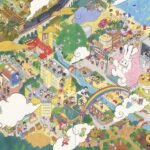Da Shi Jie
Have a Nice Day / 大世界 / Da Shijie / Dashijie / Hao Ji Le / Haojile / 好极了
| Genres: Psychological, Suspense | |
| Themes: Psychological | |
| Studios: Le-joy Animation Studio | |
| Producers: Beijing Enlight Pictures, Horgos Coloroom Pictures | |
| Rating: 5.98 / 10 | |
| Rank: #10244 | |
| Popularity: #14373 | |
| Users Listed: 1,079 | |
| Users Scored: 234 | |
| NSFW: No | |
| Last Updated: 07/12/2020 | |
| Aired: January 12, 2018 (Winter) | |
| Type: movie | |
| Source: original | |
| Age Rating: R | |
| Episodes: 1 |
Synopsis:
Beneath the looming clouds of a Southern Chinese town, an ordinary life is irrevocably disrupted. Xiao Zhang, a driver burdened by his fiancée's medical debt, makes a fateful decision – he steals a bag containing a million from his employer. This act sets off a chain reaction, transforming the close-knit community into a landscape of suspicion and pursuit.
The narrative unfolds within a single night, charting the desperate measures taken by those seeking to recover the stolen funds. It explores themes of loyalty, desperation, and the fragility of social bonds when faced with unforeseen circumstances. The story emphasizes character interactions and the escalating tension as Xiao Zhang navigates a web of familiar faces turned adversaries, forcing him to confront the consequences of his actions against the backdrop of a rapidly changing community.
You May Also Like:
Staff:
- Liu, Jian (Director)
Reviews:
-
User fairatbest (Score: 7/10):
A dark meditation on the false promise of Chinese Communism and the lower classes’ desperate search for economic prosperity. Have a Nice Day features a wide ensemble of characters who are united in their poverty within Chinese society. The film demonstrates how, without meaningful opportunites to advance economically, there’s hardly room for the moral nuances of these characters’ survival struggle (which leaves little room for the viewer to judge.) Characters can subscribe to the spiritual schools of Buddha, Bill Gates or Mao and still not have the means to afford quality plastic surgery (like the Koreans), let alone material bliss in the form of onlineshopping. But hey, it’s good to dream of Shangri-la, right? nnThe film’s quintessential scene involves one character explaining 自由 (zìyóu or freedom) using the analogy of shopping, perhaps more specifically of affording. From that story, it’s clear: None of these people are free. Freedom isn’t found in poverty - but violence is. And things are going to get real bloody.

























